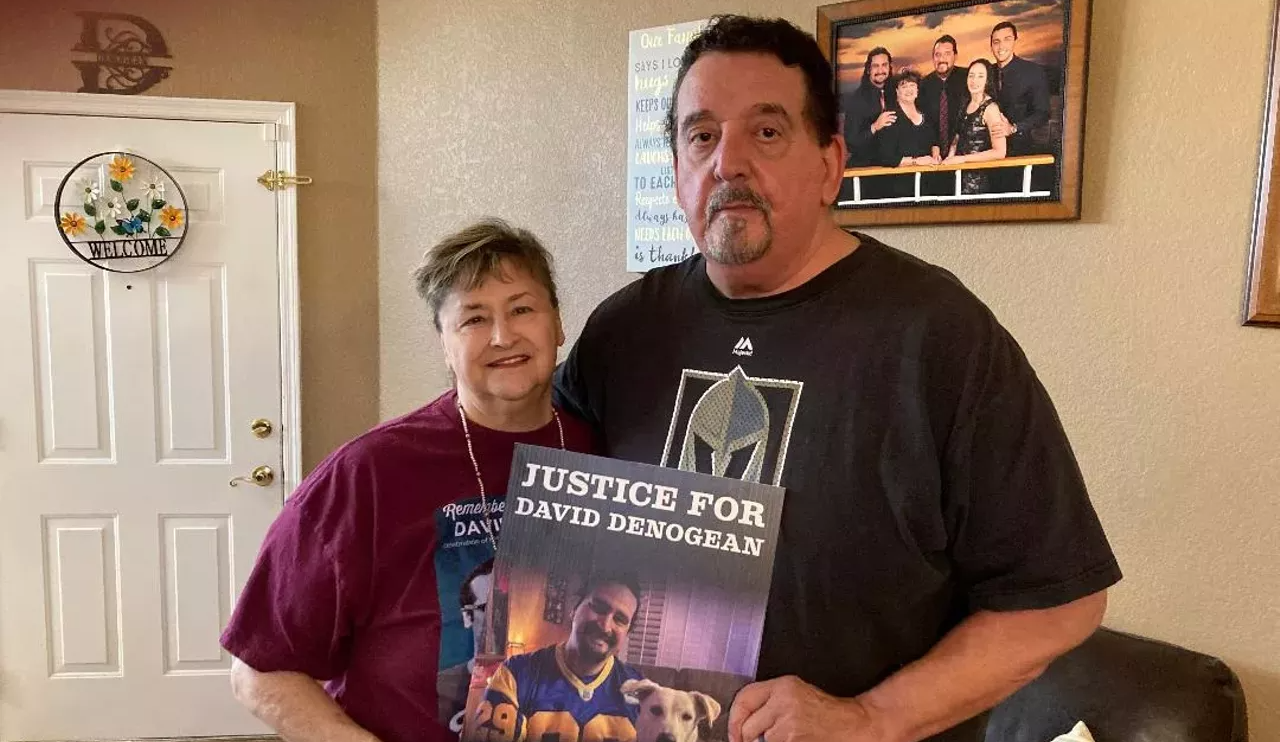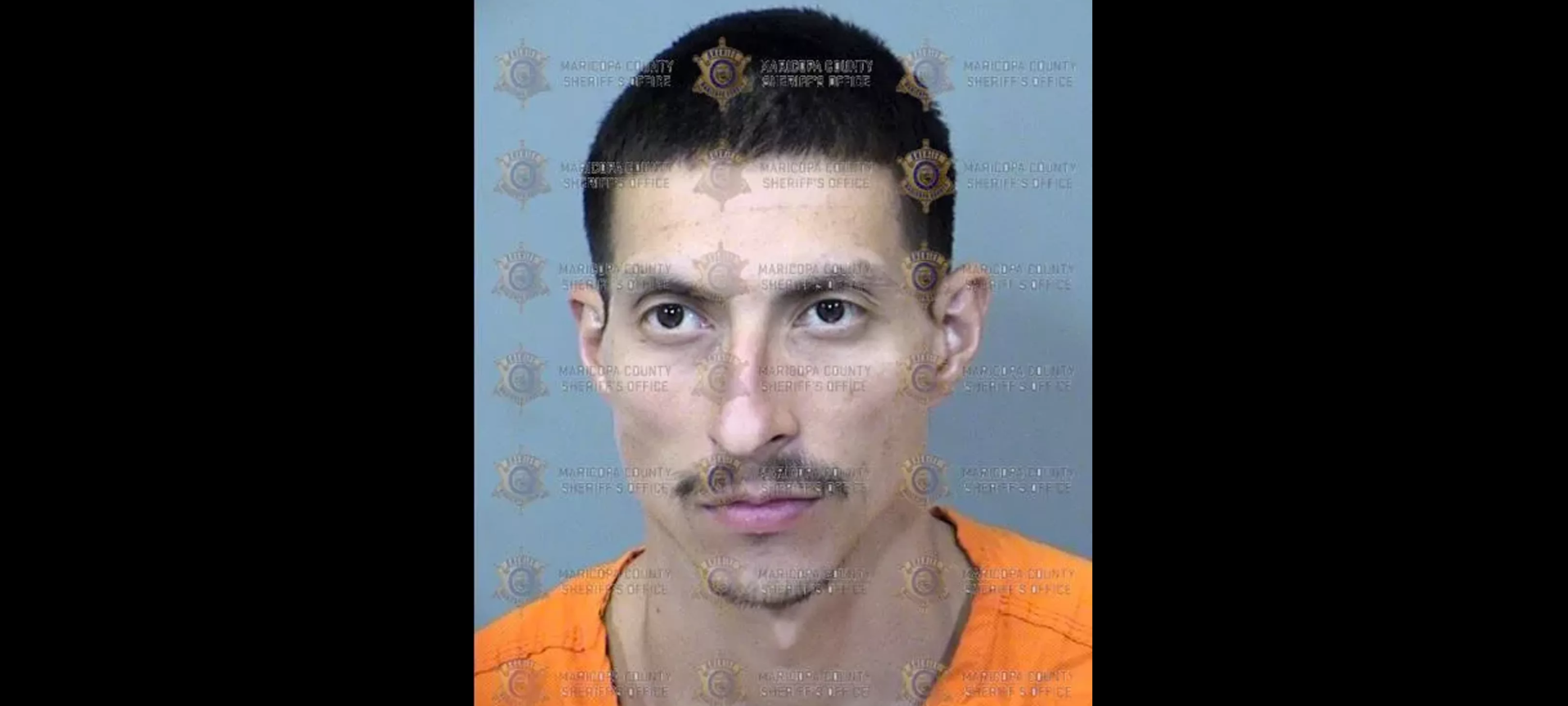
Stephen Lemons

Audio By Carbonatix
Editor’s note: This story has been updated to include information from the Arizona Attorney General’s Office.
***
The Chandler home of Frank and Judy Denogean is filled with images of their eldest son, David. In hat and gown when he graduated from Arizona State University with a degree in secondary education. Suited up for a game when he played football for Phoenix College. In dark glasses, looking suave, when he worked the door at the Rebel Lounge. And a more recent one, holding in his arms his pet Labrador, Evie, who was next to him the night he was murdered.
Nearly three years ago, Denogean, a popular track coach at Camelback High School, was killed by a gunman in an unprovoked attack outside a popular central Phoenix bar. He was 30. His killing remains officially unsolved, and there have been few updates on the case as the investigation has petered out. Or, at least, that’s what Denogean’s family thought.
Earlier this month, Phoenix New Times revealed the existence of a suspect in Denogean’s murder, a man currently serving time for a remarkably similar killing committed just one day after Denogean was fatally shot in November 2022. According to a Phoenix police incident report obtained by New Times via a records request, police detectives zeroed in on Eduardo Quintero two years ago, though Quintero has never been charged in connection with the crime.
That was news to Frank and Judy Denogean. The retired educators wonder why Phoenix police never saw fit to tell them.
“Had you not told us about a report being released, we would not even know,” Frank said during a recent interview. “When you’re hearing it from sources other than them, it’s kind of shocking.”
To the Denogeans, both 67, that’s depressingly par for the course when it comes to dealing with Phoenix police. Time and time again, they said, the Phoenix Police Department has failed to inform them – fully or at all – of crucial information and developments in their murdered son’s case.
Even on the day of Denogean’s killing, police were reticent to share information with them, the couple said. Denogean’s family found out through third parties which hospital he had been taken to. Police did not tell them that Denogean was at the hospital until officers informed them he was dead, they said.
Judy and Frank said they met with detectives about a month after the murder. Daniel Denogean, the younger brother of David and a Phoenix firefighter, was designated the contact person for the cops. Daniel said he last texted with homicide detectives about a year after the murder, but he said he’s had no contact with them since then. He idolized his brother, naming a child after him. The release of the police report, first obtained by New Times, was a shocker to him as well.
Denogean’s parents also said they did not receive a warning in 2023 before Silent Witness, the nonprofit police agency that solicits crime tips from the public, released a partial video showing the moments before Denogean was gunned down. Frank learned of the release when Judy called to tell him she’d seen it on TV. At the time, he was tending to his son’s grave.
Judy said she found the situation “disheartening,” adding, “It never ends for us. We’re going to have to live with this for the rest of our lives.” Frank said that a police sergeant later admitted to him that they had “dropped the ball.”
“They use that all the time,” Frank said bitterly. “‘We dropped the ball.’ That must be the department catchphrase instead of ‘to serve and protect.'”

The late David Denogean.
Chris Chappell
Excuses, excuses
Asked why it took so long for the department to release the Denogean report, Phoenix police spokesperson Donna Rossi stated via email that the department receives “approximately 11,000 requests a month” and is currently processing “more than 35,000 requests.” In February 2023, she added, the number of outstanding requests was more than 56,000.
“These requests are processed in the order in which they are received,” Rossi wrote. “There are varying factors to consider before a report is released, including the case status and whether its release will compromise the investigation.”
But according to noted media law attorney (and former New Times editor) David Bodney, that explanation falls way short of the mark. As a 1993 Arizona Supreme Court ruling determined, there is no exception to the state’s public records law for ongoing police investigations, he told New Times. Rather, the burden is on the law enforcement agency to demonstrate “the probability of some specific material harm” that would result from the record’s release.
Under Arizona’s public records law, a government agency must “promptly furnish” the records being requested, he added. And, as in the case with the Denogean report, more than two years ain’t prompt by a long shot.
“It’s simply an insufficient excuse to say these things take years,” he said. “That’s not statutory compliance.”
Indeed, the police did not release the report until New Times repeatedly contacted the Phoenix city attorney about the matter. It was the city attorney’s office which informed the paper that the report would be made available.
Then there is the question of why the Denogean family was not told that the police had a suspect in their son’s murder. In 1990, Arizona voters made the Victim’s Bill of Rights part of the state constitution, requiring agencies to treat victims with “fairness, respect and dignity.” A host of statutes followed, requiring that victims be informed of a suspect’s arrest and the date and time of his or her initial appearance, so that family could attend and be heard at certain court hearings.
Because Quintero, the suspect in Denogean’s case, was never arrested or charged for the crime, the Denogeans fell through the cracks of those laws.
According to Delaney Cocoran, a spokesperson for the Arizona Attorney General’s Office, other than in the event of an arrest, a law enforcement agency “is not required to reach out to the victim to provide case updates.” She added that police are not bound by law to inform victims when a report or a video is being released, though law enforcement agencies do have to comply with the victims’ privacy rights in doing so. Police are required to prioritize public records requests from victims, according to Kirstin Flores, the director of the Office of Victim Services for the attorney general, though it’s not clear if Denogean’s family submitted one.
Maybe, but the Denogeans are not making a legal argument as much as a moral one about a family facing tremendous grief. Judy conceded that hers is not the only family struggling from a loss from homicide and that “to investigate a murder is very hard.” But, she said, she wished the police “were more forthcoming with some of this information.”

Eduardo Quintero’s mugshot after he was booked for the murder of Joseph Patruno.
Maricopa County Sheriff’s Office
A cold case
Phoenix police now consider the brazen murder of Denogean to be a “cold” case, despite the department having a suspect who is already in prison serving time for a different murder. Rossi told New Times that the original case agent has moved on and is now a “sergeant in training in our patrol division” and that the Denogean homicide is currently “assigned to our ‘cold case’ division.”
The theory of the case is already well-established. A day after Denogean was killed, Quintero murdered 57-year-old commercial painter and musician Joseph Patruno at a 76 gas station near Bell and Cave Creek roads. A detective investigating that killing quickly noted the similarities to Denogean’s murder and alerted the investigator on that case.
That investigator detailed the similarities between the two cases in the incident report. Both men were near their respective homes when they were gunned down in public without provocation – Denogean while he was walking his dog, Patruno while he was pumping gas into his truck. However, different weapons were used and while Denogean’s killer fled, Quintero threw the gun down after killing Patruno and surrendered at the scene. (Patruno’s family declined to be interviewed for this story.)
Quintero later pleaded guilty to second-degree murder and was sentenced to 25 years, with credit for time served, as part of a curiously generous plea deal with the office of Maricopa County Attorney Rachel Mitchell. Homicide detectives believed Quintero was also Denogean’s killer and confronted him with the accusation in late 2023 while he was in jail on the Patruno murder. But Quintero invoked his right to counsel, and the case was never formally submitted to prosecutors for charging.
Law enforcement sources told New Times that cops pressed prosecutors to make a confession to the Denogean homicide part of any plea deal with Quintero, but that did not happen. Police recently told ABC 15 that Quintero was their only suspect in the Denogean shooting.
Rossi claimed the investigation was still “open and active” and that “a new set of eyes” is reviewing the case. Those eyes belong to the department’s Cold Case Unit, which Phoenix police spokesperson Sgt. Brian Bower said handles various categories of cold cases, including homicides, suspicious deaths, missing persons, sexual assault and unidentified victims. According to Bower, the Cold Case Unit is currently comprised of nine sworn detectives, four civilian investigators and a sergeant. There is also a civilian volunteer and a reserve officer attached to the unit.
Bower said all detectives work all categories, but the majority of cases are homicides, which reportedly could number more than 3,000, though Bower said the figure fluctuates.
That’s sub-zero comfort to Denogean’s parents. Still, despite the lack of progress on the case, Frank and Judy plan to continue doing anniversary vigils and Christmas toy drives in their son’s name. Though cold, the case is still open, and the Silent Witness reward on Denogean’s case is now around $24,000, per the family.
Frank recalled a Phoenix homicide detective telling him that his son’s murder was a capital offense and that the perpetrator would get the death penalty if caught and convicted. Frank said he told the investigator they just wanted whoever did it off the streets, because the death penalty wouldn’t bring their son back. Quintero is off the streets – albeit for a different killing – but Frank is amazed at the light sentence he received.
“That sentence of 25 years, I just feel for the family because they know for sure he’s the murderer,” he said, shaking his head. “And they call that justice.”
This story is part of the Arizona Watchdog Project, a yearlong reporting effort led by New Times and supported by the Trace Foundation, in partnership with Deep South Today.